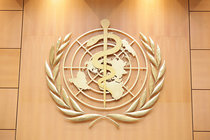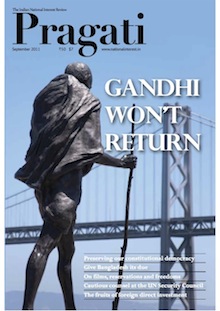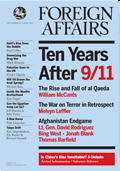Water are we arguing about?
Indo-Pak hydro-politics must evolve from endless debates over ‘water division’ and Run-of-River dams to more sustainable efforts like demand management, resource sharing and disaster management.
 Courtesy: Pragati
Courtesy: Pragati
Indo-Pak hydro-politics must evolve from endless debates over ‘water division’ and Run-of-River dams to more sustainable efforts like demand management, resource sharing and disaster management.
 Courtesy: India Briefing
Courtesy: India Briefing
Amendments in India's Industrial Policy has brought reduction in the number of industries reserved for public sector. The policy focuses on deregulating the Indian industry and providing it with more freedom and flexibility and facilitating growth within the country’s industry.
 Courtesy: Pragati
Courtesy: Pragati
IBSA’s abstention over Syria is an argument against Security Council reform. Critics of reform have long argued that increasing the number of permanent members to include Brazil and India would lead to paralysis.
 Courtesy: US Mission Geneva
Courtesy: US Mission Geneva
Over the last three decades, public funding for global health organizations has dried up. Private companies are writing checks to fill the gap and are bending the agenda toward their interests. Realigning priorities will mean getting more private firms involved - not less.
 Courtesy: Foreign Affairs
Courtesy: Foreign Affairs
As Indonesia hosts a number of high-level summits this year, it looks set to take its place among the world’s economic superstars. But celebrations are premature: although Indonesia has made great strides, its gains are reversible. To continue to prosper, Jakarta must address rampant corruption and poor governance
 Courtesy: Foreign Affairs
Courtesy: Foreign Affairs
Is China poised to take over from the United States as the world’s leading economy? Yes, judging by its GDP, trade flows, and ability to act as a creditor to the rest of the world. In fact, China’s economic dominance will be far greater and come about far sooner than most observers realize.

India and the United States have grown close very quickly over the last decade. Their commitment towards the war on terror, pursuit of joint energy security, and the prevention of the proliferation of nuclear weaponry are some on a long list of common goals.
While carbon capture fitted coal plants are opening all over the world, the global demand for cheap energy is climbing. The initial investment for carbon capture technologies, though, is high, and green technologies are struggling to have an impact on pollution levels.
 Courtesy: Pragati
Courtesy: Pragati
India has pursued a careful, well-thought out policy to prove that it can be a responsible permanent member on the UN Security Council.
 Courtesy: Foreign Affairs
Courtesy: Foreign Affairs
In 2001, fearing ethnic strife, the international community pushed for a strong central government in Kabul. But such fears fostered a system of regional and ethnic patronage. To correct matters, the U.S. should de-emphasize Afghanistan’s ethnic fault lines and push for more devolved and inclusive governance.